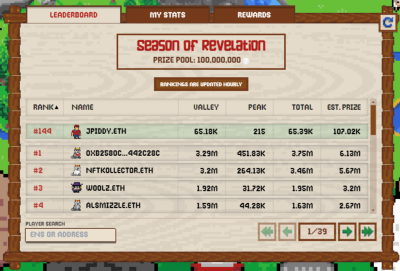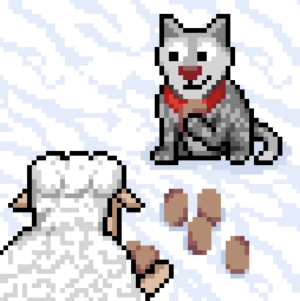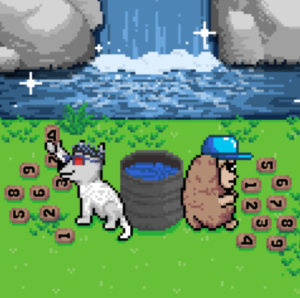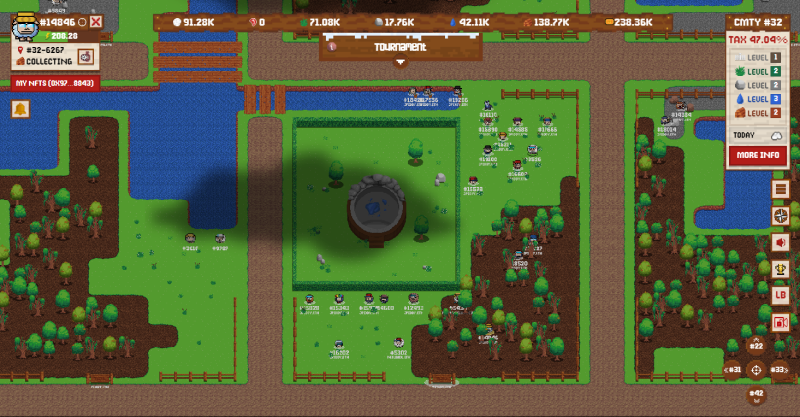Getting Started
The Goal
The goal in Wolf Game is wool accumulation. Wool is power, used to grow economic dominance through breeding and gathering, governance, and more. The best way to accumulate wool is by playing the game and climbing the seasonal leaderboards by earning points.
Points
There are many ways to earn points, and so there are many ways to play Wolf Game. Points are earned by spending your animal's energy in the game through breeding, stealing, gathering, looting, sabotaging, playing Peak Games, and more. Actions also give you various bonus multipliers, so not all energy spent will earn equal points. Read more about Points here.
Seasons & Pouches

The Leaderboard is broken up into Seasons with different themes and prize pools. Season 1 has a 100M Wool Leaderboard prize pool. At the end of a season, all the wool is distributed to everyone who earned points in the form of Wool Pouches. These pouches drip Wool over a fixed timeframe of 4 years. So if you win a 200k wool pouch, then 137 wool will unlock from that pouch each day for 4 years. You can claim your wool pouches by visiting the Wolf Game website, here. These pouches are also sellable to other players on Open Sea and Blur.
At the beginning of each new season, players start with 0 points. This ensures new players can enter the game without having a major disadvantage.
READ MORE ABOUT HOW SEASONS WORK HERE.
Peak Games

Peak Games are regularly scheduled skill based head to head minigames that can take anywhere from 5-15 minutes to play on average. There are three levels of risk at the Peak:
- The Base: 500 wool + 10 credits (earns 40 pts)
- The Slope: 5,000 wool + 100 credits (earns 500 pts)
- The Summit: 50,000 wool + 1,000 credits (earns 6,000 pts)
If you win the mini game, then you take 95% of the wagered wool. The remaining 5% is burned and/or used for ongoing community rewards. Both players earn the Leaderboard points, no matter who wins.
Playing Peak Games is the fastest way to climb the leaderboard, but you will need a lot of Peak Credits and an appetite for risk. Peak Credits can be created in-game from your animals' available energy, just click on the credits icon at the top of the in-game resource menu.
Animals
| Sheep are the workers of the farm.
They are required for: |
Wolves are superior for a number of reasons: |
|---|---|
|
|
| Read more about Sheep actions and strategy | Read more about Wolf actions and strategy |
Energy
As you play the game, your animals will lose energy depending on how you use them. In order to recharge your animal, you will need to enter a Bathhouse or drink a Jug. To recharge, you need to walk your animal up to an available Bath or Jughouse and click on the structure. Jugs are more efficient than Bathhouses, but they also require more time to manage.
Land & Structures
There are two types of land, structures and non-structures. Regular lands produce resources in the form of taxes from sheep that are gathering. Structured lands also produce some resources, but also give you the option to build a Den, Barn, or Bath using the different resources in the Wolf Game economy. You can use the structure for your own sheep/wolves, or rent them out to other players in exchange for Wool. To collect taxes and set your tax rate or wool fee, just click on your land while logged into the game. Remember though, taxes expire after 7 days!
[Read more about Land selection and strategy]
Farmers

There are a variety of ways to use farmers in the game, here are just a few of the big ones:
- Protect sheep from wolves while breeding
- Protect sheep from wolves while gathering
- Multiply tax collection
- Instant claim resources
Each farmer has 30 day cooldown that starts as soon as you use it. You can also rent out your farmers to other players and earn passive wool.
[Read more about Farmer actions and strategy]
Resources
Wolf Game is a dynamic economy with different resources, these resources can be used for in-game actions and will prove useful in forging your path of economic dominance and earning Wool.
| Resource | Current Utility |
|---|---|
| Wool |
Used for breeding, bathing, farmer rentals, building/upgrading structures, peak games, governance |
| Chops |
Required for breeding Gen2 Wolves |
| Water |
Required to build/upgrade Bathhouses and toggling between Bath/Jughouse |
| Stone |
Required to build/upgrade Bathhouses, Barns, and Dens |
| Wood |
Required to build/upgrade Barns and Dens |
| Grass |
Required for Breeding Gen2 Sheep |
| Pelts |
Required for higher level structures |
The in-game AMM also allows you to trade Chops, Water, Stone, Wood, and Grass interchangeably, while community tools like Feral Flips (swap tool similar to Uniswap) allow you to trade Chops with Wool directly.
Gameplay
Gameplay is centered around the assets that you own. To start playing, just connect your wallet and click on the “My NFTs” button in the top left. From there, you can select any sheep, wolf, land, and list farmers for rent. If you’d like to use your farmer, first select the sheep or land that you want to add the action to, then add the farmer.
Winning Strategies
There are several winning strategies in Wolf Game, before you buy any NFTs it may be helpful to pick a strategy that fits your style. Here’s a few popular options below, along with their historical strengths/weaknesses. Keep in mind, the economy is always changing, and strategies that were effective yesterday, may not be effective tomorrow.
Passive Strategies
Some players don’t want to spend a lot of time managing sheep and wolves, so they buy land and structures to earn wool and resources. Adding farmers into the mix allows you to boost land taxes further. Taking this passive strategy, you’ll need to pay attention to at least 2 things:
- Collecting taxes at least every 7 days before they expire.
- Adjust rental fees for structures to meet the market's demand pricing and avoid missing out on earnings.
The final part of land strategy involves concentrating your lands into a specific community if possible. Each land you own gives you the ability to control the community wide tax rate. So, owning more land in a single community gives you more control over your game direction.
Learn more about Land strategy
Active Strategies
Active strategies are all about spending energy. There are several different ways to spend your animal’s energy in the game, and how you spend your energy will shape your velocity for advancing in the game.
Collecting and Looting

Sheep collect in the valley, and wolves typically loot the fattest sheep. These actions spend energy in small amounts each day, which means they produce small amounts of profit each day (as long as you’re playing the game optimally). These actions also require less risk, which offers less reward in return. Each time a wolf loots a sheep, a mini-game is played with presets that were determined before the sheep began collecting.
Breeding and Attacking
Breeding is the fastest way to spend your energy. It requires more risk, but offers greater reward. For example, collecting with your Gen 0 sheep means you’ll spend about 2 energy each day in the Valley, collecting on average 1 chop per day. However, breeding with that sheep means you’ll spend as high as 18 energy per day, and produce a lot more chops as well.
Breeding also comes with more strategic decisions like community and barn selection, farmer usage, when to pull your sheep, attack a barn, etc.
What's Next?
Now that you understand the basics, stay up to day with The Valley Report. In this periodic report, I will give updates on the economic conditions of the valley, identify current meta and trends, and help you navigate the game.
The Wool Paper
The Wool Paper is a document provided by the Shepherd that explains all the mechanics of Wolf Game. This website is meant to complement his Wool Paper. It would be a good idea to read the Wool Paper first before you read a lot of the strategy provided on this website.

